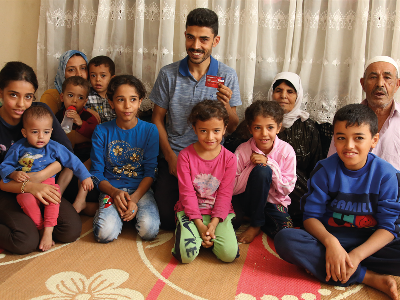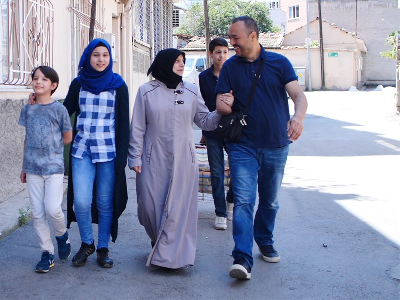The Emergency Social Safety Net (ESSN)
Turkey is home to the largest refugee population in the world, hosting more than 4 million refugees, a majority coming from Syria. Through a partnership financed by European Union Civil Protection and Humanitarian Aid Operations (ECHO) under the EU Facility for Refugees in Turkey, the International Federation of Red Cross and Red Crescent Societies (IFRC) and the Turkish Red Crescent will provide cash assistance to more than 1.7 million people each month thanks to the EUR 500 million Emergency Social Safety Net (ESSN).
Nine years into the conflict in Syria, an estimated 5.6 million Syrians are registered as refugees in neighbouring countries, of which 3.6 million reside in Turkey. For many refugees, years of displacement have resulted in them being unable to meet their basic needs, such as food, rent, and transportation. According to the United Nations High Commissioner for Refugees (UNHCR), nearly 98% of the refugees in the country live outside of camps. Often, they need to find food and their own place to sleep, without speaking the local language. Moreover, they tend to be amongst those most exposed to infection and least able to access health care, leaving them in an even more uncertain situation in the context of the current COVID-19 pandemic.
Since 2016, the Turkish Red Crescent has been working with the World Food Programme (WFP) to support millions of refugees in Turkey through the ESSN – the largest humanitarian programme in the history of the EU. On 1 April 2020, IFRC took over from WFP as the leading partner of the ESSN. In collaboration with 300 dedicated Turkish Red Crescent staff working on the ground, the IFRC will continue to give regular and predictable monthly cash assistance through debit cards to vulnerable refugees in Turkey. Compared to giving out aid in the form of handouts, the debit card is an efficient way to support families to purchase what they most need, providing them with the dignity of choice.
In a humanitarian context, cash can be an effective tool as it gives families the freedom and independence to take control of their own lives while contributing to their host communities. Cash also affords flexibility for humanitarian services to rapidly address evolving needs during an emergency, including through the provision of additional cash for refugees who risk being left behind. Under ESSN, families will receive 120 Turkish Lira (approximately EUR 17) and additional quarterly top-ups based on family size, with special payments made to families with members who require specialised care. The funds will allow them to cover essentials like rent, transport, bills, food, and medicine. It will also help more children to go to school, as they will no longer have to work to support their families.
Stories from the Field

Hüseyin Yusuf, a barber from Aleppo, had to leave Syria with his family as the conflict had reached his neighbourhood. The family moved to Gaziantep in the South-East of Turkey. Not speaking Turkish, Hüseyin had difficulties in finding employment which pushed the household into financial instability. However, the support given to his family through the ESSN helped them to meet their essential needs and enabled his children to go to school. “Life started to look brighter when we started receiving cash assistance. We are full of gratitude”, says Hüseyin.

Bassam operated a textile factory in Aleppo prior to leaving Syria with his family five years ago. Unfamiliar with their new city, the family faced multiple challenges in Turkey. However, ESSN support helped them to better integrate into the local community and begin a new life. Bassam could attend Turkish language courses offered by the Turkish Red Crescent. He received a job offer in a textile factory and is now working in a senior-level position, bringing in his artisan skills from Aleppo´s textile scene.
To learn more, visit https://media.ifrc.org/ifrc/essn/
For media inquiries, please contact Eva Oyón on: eva.oyon@redcross.eu or +32 2 235 09 22

